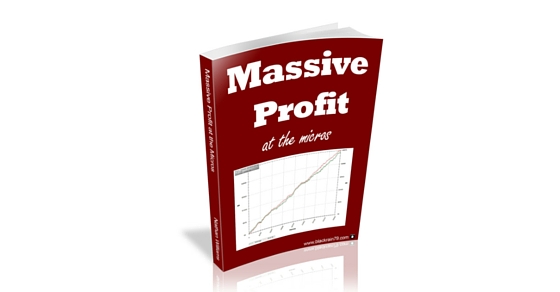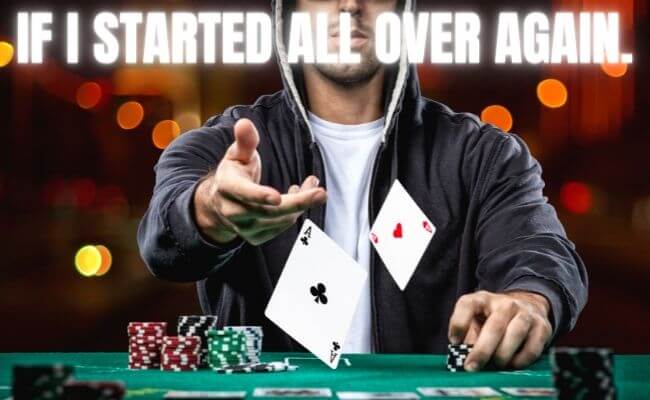This article was written by blackrain79.com contributor Fran Ferlan.
If I could start poker all over again, I’d repeat all the mistakes, but I’d do
it much sooner.
The fact is, the best experience comes from mistakes, and sadly, usually from
our own. It would be much better if we could learn from other people’s
mistakes.
With that in mind, here are the top 5 pieces of advice I would have given to my
younger self at the beginning of my poker journey.
1. You Don’t Have It All Figured Out
This is something I advise aspiring poker players to repeat to themselves,
regardless of where they are at their poker journey, but especially at the
beginning.
Poker is deceptively simple, and it doesn’t take long to transition from a
totally clueless fish to a decent winner, especially at the lower
stakes.
But there is something deeply pernicious about this seeming effortlessness
when you first start out playing poker. It’s especially dangerous if you
happen to run well in the beginning.
It’s easy to assume you have some innate talent, a card sense, or whatever you
want to call it, when in reality you just didn’t get tested by negative
variance, or you didn’t go toe-to-toe against actually skilled competition.
Odds are, you aren’t quite able to differentiate between your skill edge and
positive variance, and are too quick to ascribe positive results to your
superior skills, and negative results to other players just getting lucky
against you.
In other words, you don’t even know what you don’t know, and this makes
further improvement virtually impossible.
You don’t even feel like you need improving, because you’re crushing the game beyond belief, after all.

You think it’s just a matter of time before you’re playing high stakes and retiring early with your poker winnings.

You think it’s just a matter of time before you’re playing high stakes and retiring early with your poker winnings.
Until your first serious downswing, that is.
But since you’ve been killing it for a while, you don’t think much of it,
because you know variance is a thing, and you think it’s just temporary.
So you wait for the next upswing (and you believe you’re owed one), but it
never seems to happen.
You start to get frustrated, jump up the stakes, play outside your bankroll,
chase your losses and so on. Yet, it never occurs to you that you might be, in
fact, getting outplayed.
You already know everything there is to know, you’ve watched a bunch of
youtube videos, read a ton of articles, maybe even a book or two.
You’re way better than the rest of the degenerate gamblers you’re playing
against, so why the hell aren’t you making bank?
The short answer is: you’re not as good as you think you are. You might have
read a couple of articles here and there, but guess what?
So did everyone else.
And this may also be a shocker, but people aren’t too
keen on giving their money away, even when playing cards.
Poker is incredibly competitive, and to truly get ahead, knowing the
fundamental winning strategy is only the beginning of the journey, not the
end.
So never be quick to assume you have it all figured out, because chances are,
you don’t.
2. You Probably Won’t Get Rich Playing Poker
The prospect of becoming a full time poker pro may seem very enticing to a lot
of people.
Being your own boss, setting your own hours, and being able to
travel the world seems as close to a perfect job there is.
Not to mention you get to do something you actually enjoy doing instead of
wilting away at some soulless corporate job.
It’s definitely the case that being a professional poker player offers a level
of freedom that’s just not feasible for most other day jobs. But that’s not to
say that it’s without its challenges.
In fact, it’s actually way harder to make a comfortable living playing cards
than in your average 9-5, and most do not get rich either as Nathan discussed in a recent video.
That’s because you only have yourself to rely on, and you don’t have any
immediate pressure of getting fired if you don’t show up to work.
There are no predesigned systems that compel you to show up at the office, day
in and day out. There’s also no guarantee of a paycheck at the end of the
month.
How much you earn depends entirely on the amount of effort you put in, and
even then, you’re still not guaranteed to win, because variance plays a
significant role in determining your short term results.
This means that there will be periods where you will actually lose money, even
if you do everything right.
Imagine toiling away in the office for 8 hours every day, and then showing up
at the end of the month to have your boss say to you that you owe him a
thousand bucks for the pleasure of sitting in a cubicle.
You wouldn’t be too thrilled about it, to say the least.
Playing poker is kind of the same way, so developing a thick skin is just one
of the many prerequisites to actually succeed in it over the long term.
Not only do you need a monk-like patience, you also need some sort of a safety
net for the times you won’t earn any money, or worse yet, lose some.
So if
you’re already living paycheck to paycheck, you might want to reconsider going
pro.
Now, I don’t want to go too deep here about what it actually takes to be a
full time poker pro, as this article is becoming too doom-and-gloom as it is.
The struggles of playing poker professionally could easily fill up an article
of its own (or a full book, for that matter).
Suffice it to say that playing cards professionally just isn’t a viable option
for the vast majority of people, let alone getting rich from it.
This doesn’t mean you can’t actually make good money playing poker, or even
turn it into a profitable side hustle.
But most people would still be better
off keeping their day job. If getting filthy rich is your primary concern,
though, there are far easier, and less stressful ways to go about it.
Learn to Make $1000 Per Month in Small Stakes Games With My Free Poker Cheat Sheet

If so, then I wrote this free poker cheat sheet for you.
This is the best completely free poker strategy guide available online today. It shows you how to crush the small stakes games step by step.
Learn exactly what hands to play and when to bet, raise and bluff all in!
These are the proven strategies that I have used as a 10+ year poker pro to create some of the highest winnings of all time in these games.
Enter your details below and I will send my free poker "cheat sheet" to your inbox right now.
3. It’s OK to Make Mistakes (Sometimes) When Playing Poker
One of my biggest mental game issues was (and still is) getting frustrated
with my own mistakes.
While the neverending coolers and suckouts are annoying
as hell, they’re an integral part of poker, and at the end of the day, there’s
not much you can really do about it but take it in stride.
You can’t really control what cards are dealt to you, so it doesn’t make sense
to get angry about it. It’s like getting angry because the rain is falling.
What’s the point?
Avoiding making mistakes, however, is something that actually is within your
control (at least theoretically).
So if you have some perfectionist
tendencies, it’s quite natural to get upset about it, especially when the
mistakes seem so glaringly obvious in hindsight.
You have a feeling you should have known better by now.
For example, maybe you made a bad call versus a big river bet, when you should have known better. Of course the tight player is never bluffing!
You also might get the
feeling that every mistake you make is another step backward that puts you
further away from your poker goals.
It destroys your winrate, and your confidence along with it, because every
mistake negates all the good plays you’ve made before, and it takes you longer
to just get back to where you were.
Poker is a never ending swing of ups and downs, and when the mistakes keep
compiling, the downs seem to go on forever.
It makes you feel like you’re
spinning in circles, without making any meaningful progress.
If all this hits too close to home, here’s the silver lining: if you’ve ever
felt like this about your game, it’s actually a good thing.
Mistakes are a natural part of the learning process. If you never make any
mistakes, it doesn’t make you a genius.
It just means you’re not learning and
you’re never trying anything new, and that is a mistake in and of
itself.
If you’re aware of your mistakes, it means you’re expanding your circle of
competence. You’re moving beyond what you already know, and are becoming aware
of where your knowledge might be lacking.
If you don’t even know you’re making mistakes, you can’t expect to correct
them, by definition. A mistake is only a mistake if you don’t learn from it.
You might want to consider adopting a Stoic philosophy towards poker, in fact, as I wrote about recently. This has helped me tremendously.
4. Progress is More Important Than Money (Especially in the Beginning)
If you’re anything like me, you were probably attracted to poker for the
prospect of making an easy buck.
Sure, you might enjoy the game well enough,
but you’d probably enjoy doing other things a lot more, like playing video
games, watching a football game and so on.
The problem is, those other activities don’t offer any monetary incentive to
do them. So with poker you get the best of both worlds. You get to do
something you enjoy AND make money while doing it.
At least that’s how I figured it’s going to play out. So I started putting in
an insane amount of volume while mass-multitabling online.
I figured I’m
beating my current limit, so all I need to do is put in enough volume, build
my bankroll, climb up the stakes, rinse and repeat.
Aside from the fact that I thought I had it all figured out, this line of
thinking proved to be insanely naive in retrospect.
Climbing the stakes is not
only difficult in and of itself, as you’ll encounter more difficult
opposition, but building a bankroll to do so is not a linear process, either.
By the way, I discuss this in much more detail in my new Elite Poker University training.
Learn EXACTLY how to start crushing small and mid stakes poker games, play semi-pro or even full time pro. Use my proven elite poker strategies to start winning fast.
Get $100 OFF Use Code: Elite100
It’s more of a one step forward and two steps back kind of process. So I kept on focusing on putting in the hours of playtime, while completely
disregarding the studying.
After all, I’m beating my current limit, so what’s
there to learn, anyway?
Then I’d climb the stakes, only to lose my hard-earned
bankroll and having to go to lower limits and grind it out again.
Rinse and
repeat.
It took me a couple of orbits like these to realize that:
a) I’m not as great a
poker player as I thought and
b) I was overly focused on the end goal (i.e.
earning a certain amount of money)
Therefore, I completely disregarded what I
actually need to do to get there (i.e. study to fix my leaks and improve my
game).
So if you feel like you’re spinning in circles without actually going
anywhere, you might be aiming at the wrong goal.
Winning money playing poker
is great, but it comes as a byproduct of improving your game.
Working on
becoming the kind of person that can actually make money playing cards is far
more rewarding than the money itself.
5. Just Have Fun, Even When You’re Losing
Anyone who has played poker for some time knows it can be an unbelievably
punishing game. The bad beats never end, the deck goes cold for days and
weeks, and your flush draws never seem to complete.
It can be emotionally and mentally challenging even at the best of times, and
it’s no wonder very few people can actually win big over the long run.
But at the end of the day, it’s not all about the money. Like I said, there
are far easier and less stressful ways to make money than playing cards.
The
fact that we’re so overly focused on the end result, i.e. making money is what
makes poker more stressful than it should be.
This is why you should in fact never be results orientated in poker, it will just cause misery.
On the contrary, there’s nothing wrong with playing poker just for fun.
In fact, that’s why
most people start playing the game in the first place. People do things for a
number of different reasons, money being just one of them.
Some people like the social aspect of poker, others play it because it’s
intellectually challenging. Others just like the thrill of gambling. There’s
nothing inherently wrong with any of these per se.
Whatever your motivation for playing poker might be, the point is this: enjoy
what you’re doing.
Even on those awful losing days where nothing seems to be
working for you. Have fun doing it or don’t do it at all.
There’s really no point in staying at the tables if it’s just causing you
frustration and heartache.
Winning or losing, playing poker is supposed to be
fun. If it’s causing strains or it interferes in some negative way with your
personal life, it’s not worth it.
The very fact you’re actually able to play poker in the first place should
make you feel incredibly grateful.
It means you have enough disposable income
and free time to do something you enjoy doing AND even make money from time to
time. When you look at the big picture, it’s nothing short of a miracle.
It sounds weird framing it this way, but yes, feel grateful the next time a
fish sucks out on you, because a) you have a fish on your table and b) you’re
able to afford losing money playing cards.
So smile and have fun. If you can’t do that, go do something else. The games
will always be there tomorrow.
If I Started Poker All Over Again (Summary)
These are some of the things I wish someone told me when I first started out
playing poker.
While there are tons of good poker books and advanced training courses out there now these days to help poker beginners quickly improve.
It would certainly save me a lot of money and heartache in the
process. Then again, a lesson learned is usually worth the price.
It’s better to learn from other people’s mistakes than your own, even though
your own mistakes make the best teachers.
With that in mind, here are some of
my own, in no particular order of relevance:
1. You don’t have it all figured out
Poker is easy to learn, but difficult to master. If you think you have it
figured out, chances are you haven’t even scratched beneath the surface. So
stay humble, and keep learning.
2. You probably won’t get rich playing poker
Poker is a hard way to make an easy living.
Even most full time poker
professionals don’t live the life of glamour or extravagance. If you want to
get rich, try something less stressful, like multi-level marketing, or trading
crypto.
3. It’s OK to make mistakes
When learning any skill, it’s natural to slip and stumble along the way. If
you’re not making mistakes, you’re not learning. Nobody is born an expert.
4. Progress is more important than money
Nobody particularly likes studying, but without taking the time to improve
your game off the felt, it will actually take you longer to achieve your
goals.
There’s nothing wrong with wanting to earn money playing poker, but
focusing on money alone isn’t going to cut it. Focus on the process instead,
and the money will take care of itself.
5. Have fun, even when you’re losing
No matter what your poker goals are, remember why you started playing poker in
the first place. Odds are, it wasn’t about the money.
There’s no point in
playing poker if you’re going to be frustrated or miserable in the process.
Enjoy what you’re doing, or don’t do it at all.
Lastly, if you want to know my complete strategy to make $1000+ per month in
small stakes games, grab a copy of
my free poker cheat sheet.

